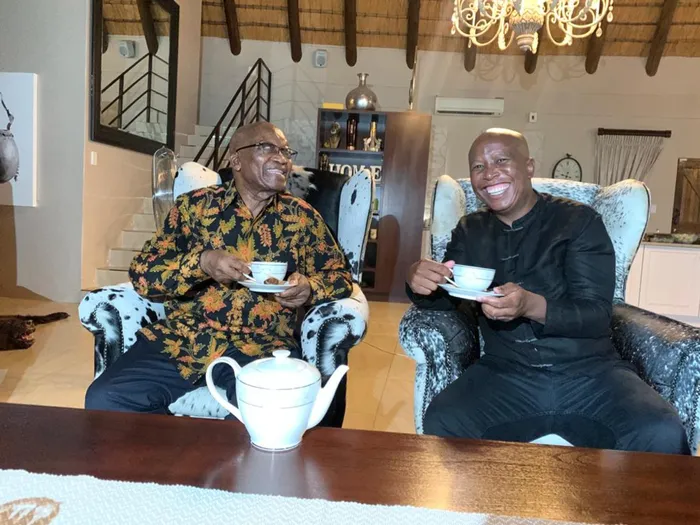The Bitter Rivalry: MK Party vs EFF and its impact on black political unity

Tensions Rise Between MK Party and EFF: A Threat to South Africa's Political Unity
Image: Picture: Supplied
The escalating tension between the newly formed MK Party and the Economic Freedom Fighters (EFF) is casting a shadow over South Africa’s already fragile political landscape where black parties have failed to unite.
Once allies in the quest for black liberation, the two parties now find themselves embroiled in a bitter rivalry, political experts warn could undermine the leftist movement and deepen political fragmentation.
Speaking at Ward 16 in Kwakwatsi, Koppies, ahead of the upcoming Ngwathe Local Municipality by-elections, Malema criticised the MK Party’s influence
"Leadership is not about numbers, but about superior logic."
He added, “There’s this party called the MK Party. Yes, they have more seats, but they are stupid. You can’t even hear what they say when they speak in Parliament. They have numbers for nothing.”
Malema’s comments highlighted the deepening rift rooted in political differences and personal rivalries that have spilled into the public domain.
The MK Party, formed after the defunct Umkhonto we Sizwe (the armed wing of the ANC), initially collaborated with the EFF, even co-founding the Progressive Caucus in Parliament, however, relations soured following the departure of Floyd Shivambu, the EFF’s former Deputy President, who now serves as the MK Party’s Secretary-General.
Shivambu, in a defiant tone, recently told the MK supporters, “We’re not begging for unity; we’re demanding it. Our people want unity among black voters, and those who refuse are charlatans.”
His remarks followed Malema's, highlighting the shift between the two parties.
Analysts weigh in, stating that the rift is less about ideology than personal animosities and leadership struggles.
Independent Political analyst Professor Sipho Seepe said, “What we see is a clash of personalities, not fundamental ideological differences.”
He added that this undermines collaboration and weakens the prospects for a united front and that the rift would discourage voters from participating in political party activities.
Seepe argued that the divide threatens to weaken the broader leftist movement in South Africa, which has long struggled to present a unified front against the dominant ANC.
“If these parties continue to fight amongst themselves, it will only benefit the ANC’s efforts to regain relevance, especially as the ANC itself appears leaderless and directionless.
Makgoba argued that both the MK Party and the EFF are led by progressive figures who have, in various ways, committed themselves to advancing the interests of black people in South Africa.
“The ongoing tensions between the two formations are unfortunate, as they reflect a more profound and more troubling reality that the liberation of black people remains incomplete.
“The inability of major black political parties to find common ground on fundamental issues suggests that fragmentation continues to undermine the pursuit of a unified black agenda.”
Makgoba argued that political parties are structured to pursue electoral dominance rather than consensus-building, and this dynamic frequently puts them at odds-even when their broader goals may align.
“As such, it is increasingly evident that traditional party politics may not be a sufficient or viable mechanism to consolidate and advance the socio-economic and political aspirations of the black majority.”
He stated that this moment calls for a critical reflection on alternative modes of organizing and mobilising beyond the ballot box.
Furthermore, he argued that building solidarities through civic movements, intellectual and cultural formations, labor unions, and grassroots activism may offer more sustainable pathways for articulating and realizing a transformative Black agenda that is not beholden to the short-term imperatives of electoral cycles but grounded in long-term structural change.
Shivambu’s call to unite voters rather than leaders hints at a strategic shift that could transcend party politics.
Zakhele Ndlovu, a political science lecturer at the University of KwaZulu-Natal, warned that targeting the same voter base.
“Both the MK Party and the EFF are vying for the same electorate - disillusioned voters tired of ANC's decline and yearning for radical change.”
“The hostility between Malema and Shivambu, driven by personal issues and leadership mistrust, hampers any chance of cooperation,” Ndlovu explained.
While the current tensions seem entrenched, experts agreed that a resolution hinges on leadership maturity and the recognition that external forces - be they foreign or domestic - stand to benefit from continued division.
thabo.makwakwa@inl.co.za
IOL Politics
Related Topics:
